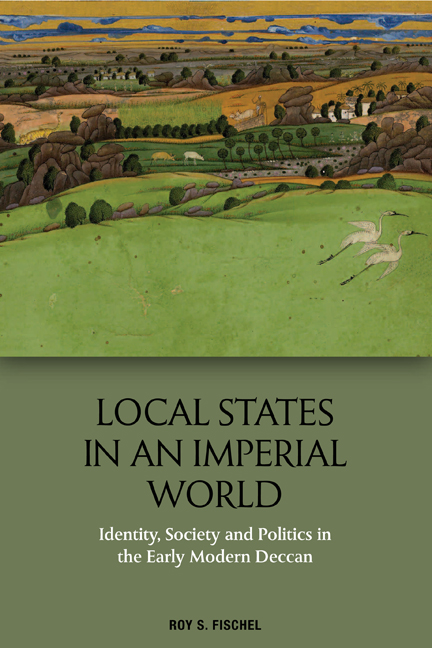Book contents
- Frontmatter
- Contents
- List of Illustrations and Tables
- Note on Transliteration
- Acknowledgements
- Introduction
- 1 Mapping the Deccan
- 2 The Sultanates and the Deccan
- 3 Foreigners, Locals and the World
- 4 Locality, Vernacular and Political Language
- 5 Limitations of the Deccani System
- 6 Conclusion: Hoopoes and Falcons
- Bibliography
- Index
3 - Foreigners, Locals and the World
Published online by Cambridge University Press: 26 September 2020
- Frontmatter
- Contents
- List of Illustrations and Tables
- Note on Transliteration
- Acknowledgements
- Introduction
- 1 Mapping the Deccan
- 2 The Sultanates and the Deccan
- 3 Foreigners, Locals and the World
- 4 Locality, Vernacular and Political Language
- 5 Limitations of the Deccani System
- 6 Conclusion: Hoopoes and Falcons
- Bibliography
- Index
Summary
On the opposite side from the Deccanis in terms of their association with the Deccan as a region and with the sultanates as its dominant political organisation, stand the self-styled Foreigners. In a sense, they represent a paradox in the region. On the one hand, they placed themselves at the very centre of political life in the local sultanates. On the other hand, working according to non-localised lines, they were the least related to the Deccan of all elite groups. While some settled permanently in the region and gradually became identified as Deccanis, others preferred to emphasise their foreign origin and orientations. Many continued to rely on their association with trans-regional networks that linked them to their ancestral lands rather than immersing themselves in local society. In that, the Foreigners represent an elite element that at the same time contributed to the sultanates where they settled and preferred to adhere to transient over settled life.
Albeit widely discussed in the scholarship, the analysis of these foreign elites remains limited. Previous historiography tended to treat them either as a group of loosely linked individuals, or as a united political agglomeration, overlooking their social complexity and inner workings. This partial understanding was carried further into the analysis of the Foreigners’ position in the region, limiting their engagement only to either monolithic contradiction with the Deccanis or to individual contribution to the states. This chapter aims at analysing the Foreigners as a composite and diverse group, and, furthermore, to understand them within the political and social system of the Deccan. Examining their political structures, identities and sensitivities, the Foreigners will be introduced as a somewhat problematic political element, which not only contributed to the running of local institutions, but which was also disruptive, in action or in perception. As such, the chapter will highlight the duality they presented to the Deccan and their form of engagement that was different from that demonstrated by local actors.
Migration to India in Context
Migration from West Asia and the lands around the Indian Ocean into the Deccan was by no means a new phenomenon in early modern times. Possibly as early as Mauryan times (fourth–second centuries BCE) maritime links connected India to West Asia and East Africa.
- Type
- Chapter
- Information
- Local States in an Imperial WorldIdentity, Society and Politics in the Early Modern Deccan, pp. 106 - 148Publisher: Edinburgh University PressPrint publication year: 2020



